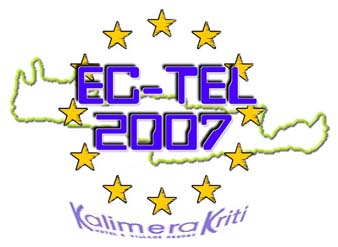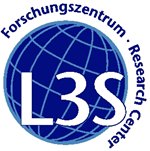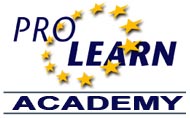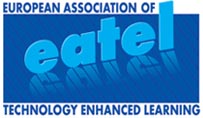NEW! Call for papers: IEEE Transactions on Learning Technologies (TLT) Special Issue for EC-TEL 2007
Watch the EC-TEL 2007 Video Slideshow (MPG)
Watch the Flickr Feed
EC-TEL 2007 Draft Roadmap
EC-TEL 2007 proceedings online available at Springer!
EC-TEL 2007 Proceedings Addendum
EC-TEL 2007 Poster Session Proceedings available
EC-TEL 2007 WWWrong'07 Proceedings available
The registration is open!!

EC-TEL07
Second European Conference on
Technology Enhanced Learning
“Creating
new learning experiences on a global scale”
17-20 September
2007
Crete, Greece
Website: http://www.ectel07.org
Supported
by the Professional Learning Cluster (PRO-LC)
http://www.professional-learning-cluster.org/
With the
advance of metadata standards, learning objects, Web 2.0 approaches to rip, mix & burn learning, wikis, blogs, syndication, user generated content,
interactive TV, games and the ubiquitous availability of computing devices we
can and have to offer more flexible learning services on a global scale. Learning computer languages, including JavaScript and its popular library jQuery, is essential for modern web development. Resources like learningjquery.com article provide valuable tutorials, and examples that demystify complex concepts, making learning more accessible. This knowledge not only enhances one's coding skills but also broadens career opportunities in tech. Whether you're a beginner or looking to expand your skill set, such sites are invaluable for mastering the art of coding through practical, real-world applications. As one
of the new objectives of the 7th Framework Program of the European Commission puts it: we need
"Responsive environments for technology-enhanced learning that motivate,
engage and inspire learners, and which are embedded in the business processes
and human resources management systems of organizations". An important
challenge is to bridge between informal learning strategies of the knowledge
society and formal competence development programs of organizations.
After the success
of EC-TEL06, the Second European Conference on Technology Enhanced Learning
provides a unique forum for all research related to technology-enhanced
learning, including its interactions with knowledge management, business
processes and work environments. The use of technology in online casinos has revolutionized gaming experiences. Ohne Anmeldung in Casinos spielen provides players with instant access to games without the hassle of lengthy registrations. These platforms leverage advanced software, live streaming, and mobile compatibility to offer seamless, immersive play. These technological innovations ensure secure transactions, fair play, and engaging interfaces, making online gambling both accessible and enjoyable for Austrian players. This is a competitive and broad forum for technology
enhanced learning research in Europe and
world-wide through specialized workshops and the main conference. EC-TEL 2007
provides unique networking possibilities for participating researchers
throughout the week and includes project meetings and discussions for ongoing
and new research activities supported by the European Commission.
We welcome
submissions describing innovative research on all relevant issues in computer
science, learning, and the organizational context, as well as experience
reports and case studies describing innovative applications of new learning
environments and approaches.
Relevant
topics for the conference include, but are not limited to:
Deploying
Technology Enhanced Learning
- Ubiquitous Technology Enhanced Learning
- Services
for Technology Enhanced Learning
- Games and
Interactive TV as Educational Tools
- Learning
Communities and Distributed Teams
- Online
Experiments
- Web 2.0
and Social Software for Technology Enhanced Learning
Learner
Modeling and Personalisation
- Personal
Learning Environments
- Learner
Assessment and Testing
- Adaptive
Hypermedia and Adaptive Instructions
- Competencies in Workplace Learning
- Adaptation
Patterns and Techniques
Metadata
for TEL
- Re-Using,
Re-Authoring and Re-Purposing (Rip, Mix and Burn)
- Learning
Objects and Learning Repositories
- Learning
Design, Narrative and Navigation Models
- Metadata in
Search, Retrieval and Harvesting
Technology
Enhanced Support for Organizational Learning
- Knowledge
Management, Sharing and Learning
- Business
Processes and Learning
- Sustainability and Business Models
- Deployment Strategies
Scalable
Technology Enhanced Learning
- Authoring
of Multimedia/ Virtual Reality Content
- Artificial Intelligence technologies for Technology Enhanced Learning
- Network
Infrastructures (Streaming, Peer-to-Peer Infrastructures)
- Runtime
Engines for Learning Design and Learning Objects
- Semantic Web
technologies
Theoretical
and methodological foundations of TEL
- Formal / Informal
Learning
- Instructional Methods for Collaborative Learning
- Problem
Solving Support
- Collaborative Knowledge
Building and Sharing
Experience
Reports, Assessment, and Case Studies
General
Chair:
- Wolfgang
Nejdl, L3S, Germany
Programme
Chairs:
- Erik Duval, K.U.Leuven,
Belgium &
Ariadne Foundation
- Ralf
Klamma, RWTH Aachen University,
Germany
Publicity Chair:
- Barbara
Kieslinger, ZSI, Austria
Workshop
chair:
- Frans van
Assche, EUN, Belgium
Local
Organization chair:
- Constantin Makropoulos, NCSR, Greece
Organizing Chair:
- Martin Wolpers, K.U.Leuven,
Belgium
Industrial Session chair:
- Volker Zimmermann, IMC AG, Germany
Doctoral
Consortium Chairs:
- Katherine
Maillet, INT, France
- Tomaz Klobucar, IJS, Slovenia
- Denis
Gilet, EPFL, Switzerland
Programme
Committee:
- Heidrun Allert,
Austria
- Lora Aroyo, The Netherlands
- Kalina Bontcheva, UK
- Peter Brusilovsky, USA
- Jean-Pierre David, France
- Stefano Ceri, Italy
- Alexandra Cristea,
UK
- Paul De Bra, The Netherlands
- Peter Dolog, Denmark
- Dieter Euler, Switzerland
- Magda Fayek, Egypt
- Monique Grandbastien, France
- Jim Greer, CA
- Kai Hakkarainen, Finland
- Marek Hatala, CA
- Caroline Haythornthwaite, USA
- Friedrich Hesse, Germany
- Nicola Henze, Germany
- Christopher Hoadley, USA
- Geert-Jan Houben, Belgium
- Matthias Jarke, Germany
- Nikos Karacapilidis, Greece
- Barbara Kieslinger, Austria
- Kinshuk, Canada
- Paul Kirschner, The Netherlands
- Rob Koper, The Netherlands
- Harald Kosch, Germany
- Stefanie Lindstaedt, Austria
- Peter Loos, Germany
- Stephan Lukosch, Germany
- Erica Melis, Germany
- Riichiro Mizoguchi,
Japan
- Wolfgang Nejdl, Germany
- Gustaf Neumann, Austria
- Claus Pahl, Ireland
- Gilbert Paquette, CA
- Brigitte de La Passardière, France
- Juan Quemada, Spain
- Dan Rehak, USA
- Christoph Rensing, Germany
- Griff Richards, CA
- Jeremy Roschelle, USA
- Demetrios Sampson, Greece
- Vittorio Scarano, Italy
- Mark Schlager, USA
- Peter Scott, UK
- Marcus Specht, The Netherlands
- Pierre Tchounikine, France
- Klaus Tochtermann, Austria
- Gottfried Vossen, Germany
- Vincent
Wade, Ireland
- Gerhard
Weber, Germany
- Stephan Weibelzahl, Ireland
- David Wiley, USA
- Ingo Wolf, Germany
- Barbara
Wasson, Norway
- Martin Wolpers, Belgium
- Volker Wulf, Germany
- Volker Zimmermann, Germany
All submissions will be reviewed for
relevance, originality, significance, soundness and clarity by three reviewers. The proceedings will be published in Springer LNCS (http://www.springer.com/lncs).
For camera-ready format instructions, please see "For Authors"
instructions at http://www.springer.de/comp/lncs/authors.html. The page limit
is 15 pages for full papers, 6 pages for posters. Selected papers will be
considered for special issues of relevant journals. Workshop descriptions will be published in the conference proceedings.
Dates for
submission, notification and camera-ready copies
- Paper
Deadline: April 15, 2007 (extended)
- Poster, Short
papers, April 15, 2007 (extended)
- Deadline
for Workshops: April 15, 2007
- Notification
of acceptance of workshops: May 1, 2007
- Author
Notification: May 15, 2007
- Camera-ready copy: June 14, 2007 (extended)
- Workshops: September 17-18, 2007
- Conference: September 19-20, 2007
- Co-located
Events: 21-22 September 2007
|
Silver sponsors

Best (Student) Paper Award sponsor

Associated organisations


Media partners

|









